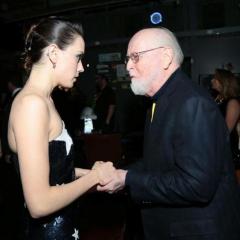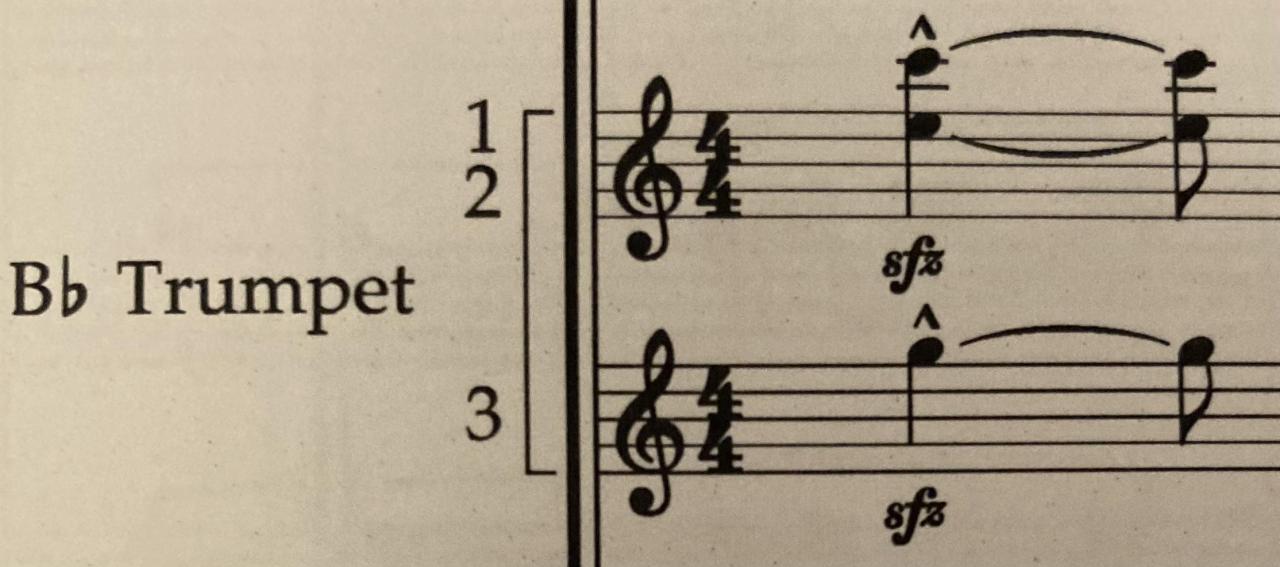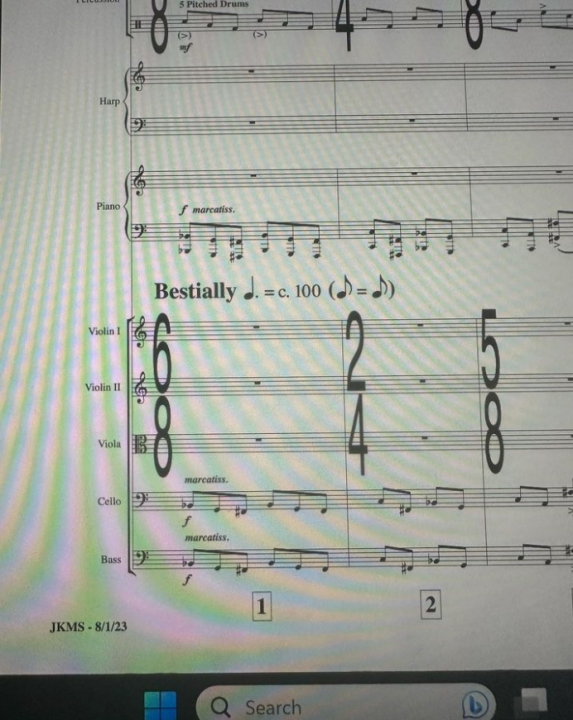-
Posts
964 -
Joined
-
Last visited
-
Days Won
1
Posts posted by Score
-
-
5 hours ago, Marian Schedenig said:
As "serious music appreciation" milestones go, Mutter/Argerich/Maisky is probably in a similar league as being performed at the Salzburg festival.
I never thought I would see the most legendary living pianist play a piece by John Williams! Martha is to piano what John is to composition. The better ones are all dead.
-
I think it would be better to define what it means to "read music". I can see at least three possible definitions, corresponding to different levels of musical training (and I'm just thinking about "reading", not "writing" or "playing from a score").
1) Being able to identify the name of a note while reading a single staff in G clef. This is a basic ability that in some countries is taught in ordinary schools, and I will never believe that any serious professional musician is unable to do this, even if they say so themselves.
2) Being able to read written music on a single staff (say, a melody) and simultaneously imagining how the melody sounds, at least in terms of relative heights of the notes; possibly, being able to sing a previously unknown melody while reading it for the first time. This is a slightly more advanced ability, which requires a few years of musical training, and dedicated practice. Where I live, in the context of a formal musical education path, you are typically required to display such ability within the second year, and you must give an exam where said ability is tested (along with others) at the end of the third year. I can well imagine that the Beatles might not be able to do this, but I find it difficult to believe that people like Zimmer, Elfman etc. - who, after all, often deal with written music and musicians who play their compositions - cannot do it.
3) Being able to read a full multi-instrumental score (many staves aligned vertically, corresponding to different instruments playing simultaneously) of moderate complexity and simultaneously imagine how it sounds, at least in relative terms. This requires several years of training and practice specifically oriented to achieve this goal; it is the bread and butter of orchestra conductors, of those composers who write everything by themselves, and of orchestrators. So, John Williams, Jerry Goldsmith, Ennio Morricone, Bernard Herrmann etc. etc. etc. are/were able to do it; people like Zimmer and Vangelis most likely not.
9 hours ago, GerateWohl said:Like in other diciplines music isn't based on music theory (unless you look at something like twelve-tone music). People made music long before music theory existed. Music theory is just a construct to describe music and to define a common language for it.
I have to disagree with this. Most of the music that most of us love would not exist without music theory; including that of John Williams. Of course, music theory evolved in time, and today's theory is different, say, from that of Mozart's times.
-
1 hour ago, Tom said:
The probability of him scoring the whole movie is the same as the probability of me watching this movie.
I literally agree, since I'll watch the movie only if he scores it.
-
19 hours ago, karelm said:
These are titans. I think 90% of people who like opera first encountered it through them. They are very, very good at this repertoire.
Besides Puccini and Verdi roles, Pavarotti also left unforgettable interpretations of Mascagni's "Cavalleria Rusticana" and Leoncavallo's "Pagliacci", the two works that, together with Puccini's operas, are the most widely recognized masterpieces of the "Verismo" movement. The core of "Pagliacci" is this desperate aria, which Pavarotti impersonates perfectly:
Here is a small curiosity, since we are among film music fans: I don't know if it is widely known outside Italy or not, but many years ago Pavarotti had a collaboration also with Michael Kamen (in addition to the well known one with John Williams on "Yes, Giorgio"). Pavarotti was invited by Zucchero (a famous pop/blues singer) to duet with him on his song "Miserere", and Michael Kamen wrote the orchestral arrangement. Here is a performance with all of them, including Kamen conducting the orchestra:
I think it's a nice piece (the arrangement is superb as well).
-
1 hour ago, karelm said:
I think very highly of Mehta's recording with Pavarotti. It is very well performed and recorded and features the legendary Pavarotti singing his signature tune.
That looks like a great setup of singers, and Mehta is a great conductor (several operas in the Sony box are conducted by him, by the way).
I guess that, in general, any recording of Puccini or Verdi that involves Pavarotti should be recommendable!
-
12 hours ago, Yavar Moradi said:
I'll echo the recommendation of Turandot. For me by far his best and most advanced work, even if he didn't quite finish it.
Definitely. The good thing with Puccini, in extreme synthesis, is that he managed to combine what's great in Verdi and what's great in Wagner, also incorporating more modern tendencies proper of the first two decades of the 20th century. For example, he and Stravinsky influenced each other in both directions, and it shows up in Turandot. My problem (and not only mine) with that opera is the ending of the story, which may be considered to be "morally unsatisfactory". Liu sacrifices herself for love to save Calaf's life, there is a dramatic moment of general mourning (the last, beautiful piece completed by Puccini before dying) and just a few minutes later, Calaf and Turandot declare their mutual love as if Liu's death meant nothing to Calaf, and the chorus ends up singing: "O Sun, o Life, o Eternity! Love shines over the world! Our infinite happiness laughs and sings in the Sun! Glory, glory glory!" on a fully triumphant setting of the "Nessun dorma" music. I'm quite sure that Puccini would have tried to change the libretto for the last scene, if he had lived, and he would have written a different music!
@Schilkeman was asking for recommendations on the best recordings, though, and I'm not an expert on that. I have Sony's complete Puccini box set, plus a couple of individual recordings of Turandot and Tosca, and I'm very happy with all of them, but I never bought other versions to compare performances.
-
On 30/09/2023 at 5:43 PM, filmmusic said:
Can anyone recommend any classical work (romanticism/post-romanticism/impressionism) which depicts (or makes subconscious associations with) God and otherworldliness with maybe mainly major chords?
Was it any symphony by Mahler? I'm not familiar with them except the 5th.
Check out the last movement, "In Paradisum", from Duruflé's Requiem. It exists in several different (original) orchestrations, the full orchestral one is here:
The movement I'm referring to starts at 37:00. I'll not tell you how it ends before you've listened to it
 9 minutes ago, Schilkeman said:
9 minutes ago, Schilkeman said:Puccini recommendations? Complete operas only.
You can start with Turandot and Tosca, and then listen to all the rest!
From the musical point of view, Turandot is the most advanced of his whole production - it was also his last opera, sadly unfinished. Tosca has a more consistent storyline, though (and excellent music anyway).
-
14 hours ago, Presto said:
I bet I could recognize it if I could hear it haha.
Maybe not! The CD track is actually edited and is a bit different from what the score dictates. The first bar is completely edited out, and the written score has there a loud trumpet combination that is a red herring, because you look for it and don't find it in the recording. Props to @Falstaft for identifying it despite this.
And by the way, what a piece! I hadn't listened to it in a while.
-
-
3 hours ago, Stark said:
I’ve only ever heard the Godfathers by Rota, any suggestions for good places to start?
In addition to "Romeo and Juliet", a great one, I also suggest "Il Gattopardo" ("The Leopard"). Very late-1800-esque, so much that at points it could be mistaken for something written by Tchaikovsky or Verdi (besides the one dance piece that was actually written by Verdi). Several very beautiful themes, and 3 or 4 nice setpieces.
- Andy and Yavar Moradi
-
 2
2
-
3 hours ago, Smeltington said:
Which recording?
My favourite performance is probably the one led by Abbado with the Lucerne Festival Orchestra (it's also on youtube). Perfect tempi, perfect feeling, perfect playing. They really get all the details right. But of course, also Bernstein's recordings of Mahler's symphonies are very important ones.
... speaking of which, listen to this anecdote from Mauceri, in case you haven't heard it yet (from 1:09:45 to 1:10:56). It's relevant to Bernstein, Mahler, film music...
-
- Popular Post
- Popular Post
6 hours ago, filmmusic said:This should win the make-up Oscar.
Does anyone know what is the music playing?
Stop whatever you are doing and go immediately to listen to Mahler's 2nd symphony!!

(seriously, it's one of the greatest symphonies ever written by anyone - especially due to the last three movements)
- bruce marshall, filmmusic and Tom Guernsey
-
 1
1
-
 1
1
-
 1
1
-
- Popular Post
- Popular Post
- Martinland, Marc, QuartalHarmony and 2 others
-
 4
4
-
 1
1
-
Interesting thread, @Thor !
For the greatest Italian living film composer, I would suggest to consider Franco Piersanti.
20 hours ago, Thor said:Russia: Daniel Deluxe (Alltime: Eduard Artemiev) <-- Sorry, Dimitri S. and Sergei, but you are not primarily film composers!
Since Dimitri wrote 36 film scores (against, e.g., 22 by Korngold, or 18 by Khachaturian), I would argue that he should be counted!
-
On 07/10/2023 at 8:40 PM, Jay said:
On October 27th we'll release a set that includes two separate albums from a prestigious film composer, but they are not film music. It’s perhaps our most ambitious project to date and certainly the most expensive and the one that has been in the works the longest, although it is certainly not for all tastes and I doubt that it will be appreciated by film music fans, but sure for contemporany music lovers.
Given the context and the description, I wonder if it is some previously unreleased non-film music by Morricone. I would be thrilled about that!
-
- Popular Post
- Popular Post
16 hours ago, Chen G. said:Generally speaking, the diegetic pieces don't sound like they "belong" with Howard Shore's score. But, then again, Wintersturme doesn't sound like it belong in The Ring, and yet its a huge favourite!
And sometimes Shore does find remarkably clever ways to make us "hear" a resemblence to his music. Like the clarinet recapitulating Pippin's aria, emphasizing the perfect fifth and bringing it closer to Gondor's music. Again, the closest example that comes to mind is Sieglinde's nightmare.
Your continuous, flawless use of the "reductio ad Wagnerum" (*) never ceases to amaze me!

(*) "Reductio ad Wagnerum" (definition invented by me right now): denotes any attempt to justify or invalidate an aesthetical judgement, classification criterion, structural analysis, or whatever else, related or not related to music, based on what Wagner did or would have done ("reductio ad Gotterdammerung" would also sound nice, but it wouldn't be correct).
- Schilkeman, blondheim, Monoverantus and 6 others
-
 3
3
-
 6
6
-
On 28/09/2023 at 7:32 PM, Richard Penna said:
Including both versions would be a perfect compromise. I'm just not going to be made to feel guilty in any way by just wanting Shore's music, and not what the actors are doing - it's a preference.
No reason to feel guilty at all. I just wanted to point out that what the actors are doing is part of Shore's music.
Anyway, there are now some AI applications that allow to recognize and separate the vocal parts from the instrumental ones in an audio track, and sometimes they work quite well. If you really want to eliminate Gandalf's voice, you might want to check those out

-
- Popular Post
- Popular Post
7 hours ago, Richard Penna said:I'd have no issue with versions being available on a set which contain the vocals.
But we should be able to hear Shore's orchestral cues on their own, without cast performances on top. People always seem to be after orchestra-only or percussion-only versions of cues around here. Why, suddenly with Tolkien are we banished from any idea of hearing the music by itself? Utterly ridiculous argument.
I'm not sure that I understand your point. We're talking, for example, of the first 40 seconds of this track:
You seem to be thinking that the chords in the strings and the flute part that one can hear below Gandalf's voice constitute an independent piece of music, that was conceived and should be heard on its own. That's not the case: it is actually the accompainment of Gandalf's song. The same applies to the funeral song in TTT: the accompainment, there a bit more varied, is in tune with the song, and it harmonizes it. The fact that the vocals are sung by actors, rather than by trained singers, is an element of realism. Removing the vocals would be the equivalent of removing McCartney's vocals from "Yesterday", and listening to the guitar and strings on their own. Or removing the trumpets from the SW main titles.
Then, one could make the point that such cues should be given their own tracks, but the fact that they were included in combination with other (purely non-diegetic) pieces is an indication that they were considered to be an integral part of the score by Shore himself.
-
1 minute ago, Presto said:
Well, the score as spoken 😉
I need to change my username...
-
5 hours ago, Richard Penna said:
I don't understand what's controversial about this. We're not talking about actual songs with a specific underscore and vocal, such as Houses of Healing.
This is about tracks such as the opening of Bag End or (worse) Keep It Secret where you have Gandalf or Bilbo doing some ditty in the background which is clearly a part of the diegetic sound, then you have Shore's cue as a separate entity. Same for Two Towers where Eowyn 'sings' during that funeral scene. The performances are clearly not a part of the score and therefore shouldn't be there on a soundtrack album.
But both the opening of Bad End and the funeral song in TTT are definitely part of the score, even if the vocals are played (diegetically) by the characters. Those pieces have both a diegetic and a non-diegetic component; the latter is the orchestral accompainment that you hear below Gandalf's or Eowyn's singing, which matches the vocals in both cases. The diegetic vocals are integral parts of the pieces.
-
20 minutes ago, Edmilson said:
No, it isn't. The OST version microedits a part from the Bilbo's Gifts scene, especifically the part where Bilbo spooks Frodo. The version I want is the complete Bilbo's Gifts followed by The Ring Goes South, without the Gilraen's Memorial between these two cues, like in the CR.
From a partial list of original cue names that was given in this forum some time ago, I reconstructed that the track "Gilraen's Memorial" from the CR should be composed as follows:
0:00-1:09 Gilraen's Song
1:09-2:40 Bilbo's Gifts
2:40-3:46 The Departure of the Fellowship
3:46-end The Ring Goes South
So, I believe you mean that you would like a track with "Bilbo's Gifts" following into "The Ring Goes South", without "The Departure of the Fellowship". Is that right?
-
On 23/08/2023 at 7:26 PM, michael_grig said:
A small breakdown of the changes that were necessary, probably to tighten up the dramaturgy a bit:
Main Title – HL SE (till bar 73)
Flag Parade – HL SE (bar 9-56 cut, bar 95-104 cut, bar 132-139cut)
Anakin’s Theme – JKMS Typeset (w/ JW fixes 07/25/23)
Duel Of The Fates – HL SE (bar 21-85cut, bar 104-137 cut)
Across The Stars – HL SE
General Grievous (BPO Edited Version – July 2023)
Enter Lord Vader (BPO Edited Version – July 2023)
Leia’s Theme – HL SE
Binary Sunset (BPO Edited Version – July 2023)
Cantina Band (Sid Ramin Boston Pops Arrangement) - HL
Asteroid Field – HL SE (bar 69-136 cut)
Yoda’s Theme – HL SE
Imperial March – HL SE
Jabba The Hutt – Short version for SW: The Story in Music [23bars]
Luke & Leia – SW Musical Journey 2009
Parade of the Ewoks – HL SE
Forest Battle – HL SE (bar 3-14cut, bar 137-153 cut)
March of the Resistance – HL SE
Rey's Theme – HL SE
Scherzo for X-Wings – HL SE
The Jedi Steps – HL SE
Chrome Dome (BPO Edited Version – July 2023)
Rebellion – HL SE (bar56-99 cut)
Speeder Chase – [unreleased] HL SE (bar 62-114 cut)
Rey and Ben – [unreleased] HL SE (unitll bar 15)
The Rise of Skywalker – [unreleased] HL SE (only until bar 104 –
attaca to “Throne Room & End Title” – HL SE (from bar 107 to end))
I'm learning right now from this thread that the legendary Sid Ramin did an arrangement of Cantina Band! And it's surely an old story - is there a recording of that version?
-
1. Star Wars
2. The Empire Strikes Back
3. E.T. The Extra-Terrestrial
4. Schindler’s List
5. Harry Potter and the Prisoner of Azkaban
6. A.I. Artificial Intelligence
7. Harry Potter and the Sorcerer’s Stone
8. Close Encounters of the Third Kind
9. Star Wars: Episode I – The Phantom Menace
10. Angela’s Ashes
-
7 hours ago, Pat_S said:
This is just a theory, so don't take anything I'm saying here as fact - but Mark Graham recently posted on Instagram this picture: https://www.instagram.com/p/CvdIKBiSt4Z/?utm_source=ig_web_copy_link&igshid=MzRlODBiNWFlZA. I recognise the cue as being Riding the Lizard from Revenge of the Sith. The recent date in the bottom left seems to imply that this version of the score has been prepared recently (and that he's not just looking in the archives for fun). (Keep in mind I have no idea how the JKMS library is set up - this could mean nothing). Perhaps this part of the score is being prepared for a future concert (which seems an odd choice), or maybe even an LTP performance of Revenge of the Sith (though the formatting is a little different to other LTP scores I've seen).. Any thoughts?
Whatever the reason, it will be an interesting one! My bet is that they are preparing the material for LTP performances.






Theme from ”Schindler’s List” (1993), arranged for piano/cello/violin trio by John Williams
in JOHN WILLIAMS
Posted
(I wasn't being literal)